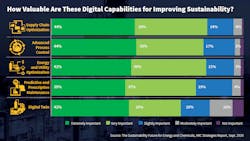Q&A: Digital technologies assist sustainability efforts within the chemical industry
Reaching sustainability targets within the industrial world has become increasingly critical as global concern about environmental impact grows, and digital technologies continue to be an essential enabler for chemical companies looking to meet business and sustainability goals. Processing recently connected with Dr. Paige Marie Morse, industry marketing director at Aspen Technology, to discuss the importance of digitalization, particularly artificial intelligence, to achieve these sustainability goals and offer new levels of operational efficiency.
Q: Could you provide some background on sustainability efforts within the chemical industry to date? How has this evolved over the last two decades or so?
A: The chemical industry has been talking about sustainability for several years now — I recently rediscovered an article I wrote on the topic in 1998 (Chemical & Engineering News, Aug. 3, 1998). The chemical industry has a long history of innovation, which will be critical in finding solutions to address the “triple bottom line,” balancing the impact of company operations on people, the planet and profits. Most chemical companies have targets for safety and environmental performance, in addition to financial success. However, sustainability-related goals are particularly important as global concern about the environmental impact of manufacturing operations has grown.
Additionally, access to the enhanced performance capabilities enabled by digital technologies is notably adding to company success in this area. Digitalization is an essential enabler for chemical companies looking to meet business and sustainability objectives. These solutions provide the visibility, analysis, insight and process optimization needed to address the challenges inherent in sustainability goals.
Q: The Sustainability Future for Energy and Chemicals, a recent ARC Strategies report released by ARC and AspenTech that surveyed global chemical and energy companies, found that 90% of companies surveyed have sustainability initiatives in place. What were the primary conclusions from the survey?
A: The survey targeted leaders at chemical and energy companies to discuss the priorities and challenges of meeting sustainability targets. The goal was to learn how digitalization and other technologies were aiding chemical and energy companies in these efforts.
The ARC survey results indicate that chemical companies are particularly concerned about and focused on sustainability objectives — more than their energy industry counterparts — even as both industries place “operational excellence” as the top priority. At the same time, both energy and chemical companies acknowledge that their skills, resources and capital often do not meet the requirements for success. Many companies reported they often rely on an infrastructure of aging assets that are not equipped for new efficiency standards.
Respondents ranked the top digital capabilities that are enabling success in sustainability initiatives, including:
- Supply chain optimization to coordinate, manage and improve transparency of connected processes.
- Advanced process control to reduce process variability and energy consumption and support autonomous operations.
- Energy and utility optimization by using process modeling and simulation technologies.
- Predictive and prescriptive maintenance using machine learning and advanced analytics to improve asset utilization and predict and avoid failures.
- Digital twin technology to provide an evolving digital profile of the historical, current and future behavior of an asset or process.
Q: What barriers still stand in the way for chemical companies to reach their sustainability goals?
A: The ARC survey noted that lack of capital or resources and aging assets are the top barriers for companies to make progress toward sustainability goals. Many chemical production assets have been in operation for decades, which creates a significant investment challenge.
A majority of infrastructure for heavy industry was designed and built without sensitivity to sustainability goals or development of new business models, according to the same survey. Older plants often lack the sensors, instrumentation and digital systems needed to optimize efficiency. Thus, there is an opportunity to upgrade and improve these assets by introducing digitalization — without even needing to overhaul legacy equipment.
Q: How can digital transformation accelerate sustainability goals in the chemical industry?
A: Digitalization is a crucial enabler for companies to meet both business and sustainability objectives. Solutions provide visibility, analysis and insight to address the challenges integral in sustainability goals.
Digital technologies have targeted corporate sustainability objectives for decades, mainly focusing on energy efficiency, but companies are aware that energy efficiency is only a portion of the challenge, with the demands of the circular economy and energy transition also necessary. Digital technologies provide a means to rapidly accelerate current efforts and, important for any business activity, chart progress and show success. Chemical processors are beginning to explore and invest in alternative energy sources and are preparing to meet the unique demands of the circular economy, where economic activity is decoupled from the consumption of finite resources and waste is re-integrated into processes. This is leading to a fundamental restructuring of current business models.
Addressing the demands of the circular economy and the energy transition require longer-term efforts, as companies develop new product and process alternatives that have less impact on the environment. For example, net-zero targets for 2050 will probably require that carbon capture processes be further developed and optimized. Digital simulations are already aiding these processes, although more optimization remains to be done. Additionally, digital technologies are helping companies develop more efficient processes to produce hydrogen, ammonia and biofuels as energy alternatives. And new processes for key chemical processes are needed to lower energy consumption and avoid waste.
Q: How can industrial AI, specifically hybrid models, lend itself to supporting and scaling sustainability efforts for organizations?
A: Artificial intelligence (AI) offers transformational capabilities to industrial operations, offering new levels of operational efficiencies by combining the insight of domain expertise with existing asset experience. Industrial AI is the term used to describe this application to industrial challenges, strengthened by AspenTech’s four decades of domain expertise in chemicals and energy.
The AI capabilities act as the “enablers” for more autonomous, intelligent processes, and the embedded engineering fundamentals act as the “infrastructure” for safe and efficient operations. Embedding AI in process models helps companies develop more efficient production options that use less energy and resources, enabling easy comparison of process options. Deep-learning advanced process control (APC) helps companies apply the optimizing power of APC to more processes, expanding production efficiencies while also boosting throughput. And, in-context guidance, provided by AI-enabled insight from previous operations, supports less-experienced users as they expand digital applications to drive further improvements.
Aspen Hybrid Models are at the center of these capabilities, which combine AI with first-principle model design and domain expertise. Engineers can now build enriched process models faster using machine learning to leverage simulation or plant data, integrating application knowledge including first principles and engineering constraints, without requiring deep process or AI expertise. These hybrid models can be used to optimize operations, create soft sensors (such as color or viscosity), design new equipment or integrate asset-wide processes such as crude-to-chemicals. For all these applications, better understanding how process conditions influence product quality can help engineers predict emissions and reduce waste — insight that can help companies progress to achieving sustainability targets.
Paige Marie Morse is the industry marketing director for chemicals at Aspen Technology. She has significant experience with leading operating companies — including Shell, Dow, Sunoco and Clariant — in R&D, marketing, commercial and strategy roles. Dr. Morse has a B.A. in chemistry from Kenyon College and a Ph.D. in chemistry from the University of Illinois.Aspen Technology

